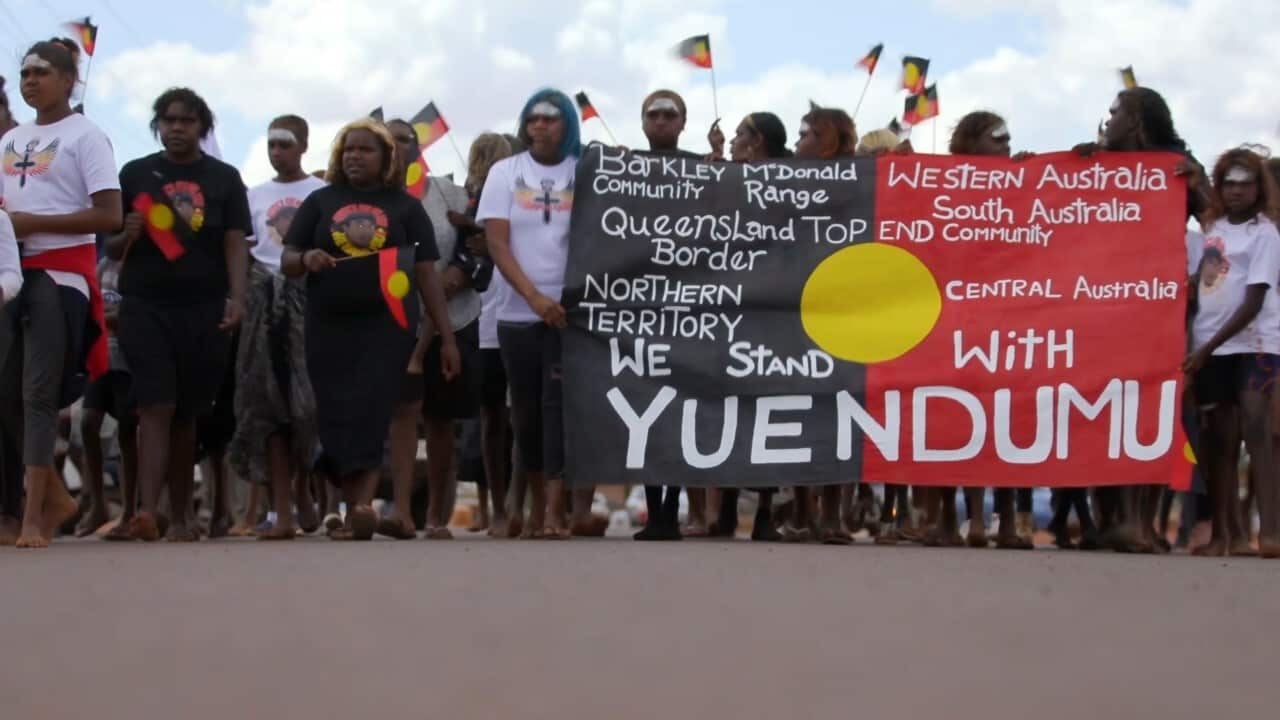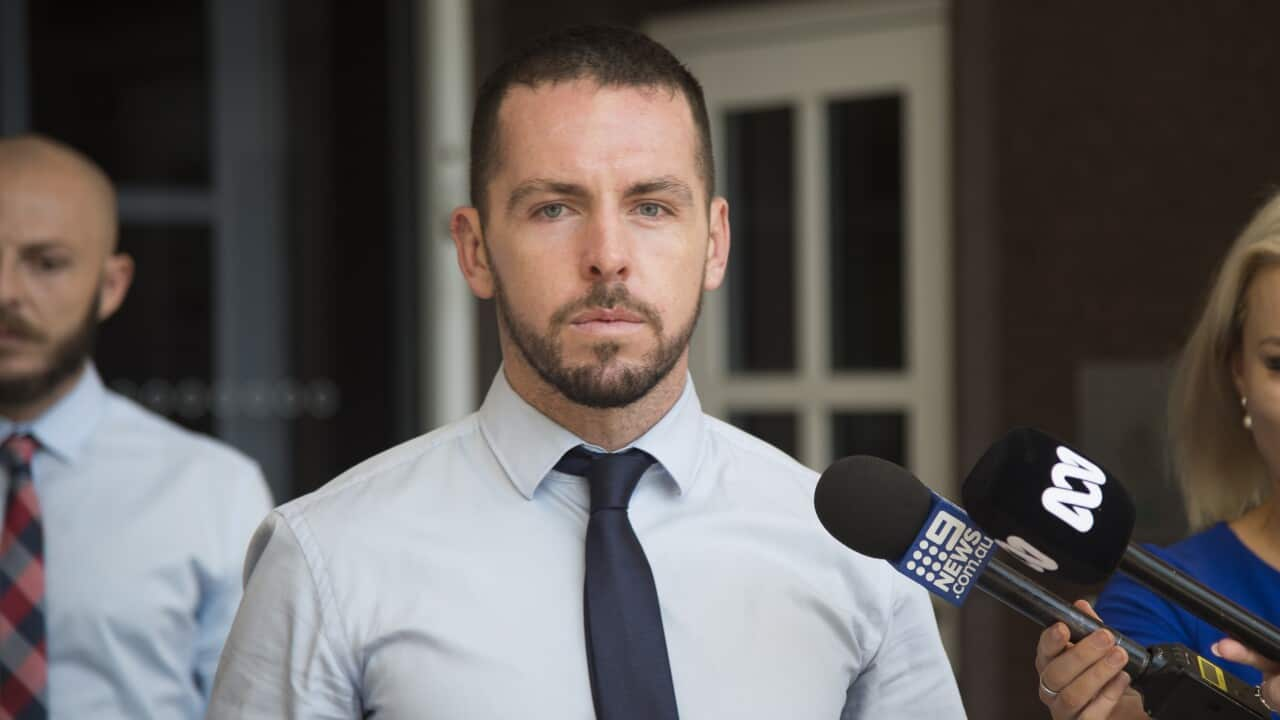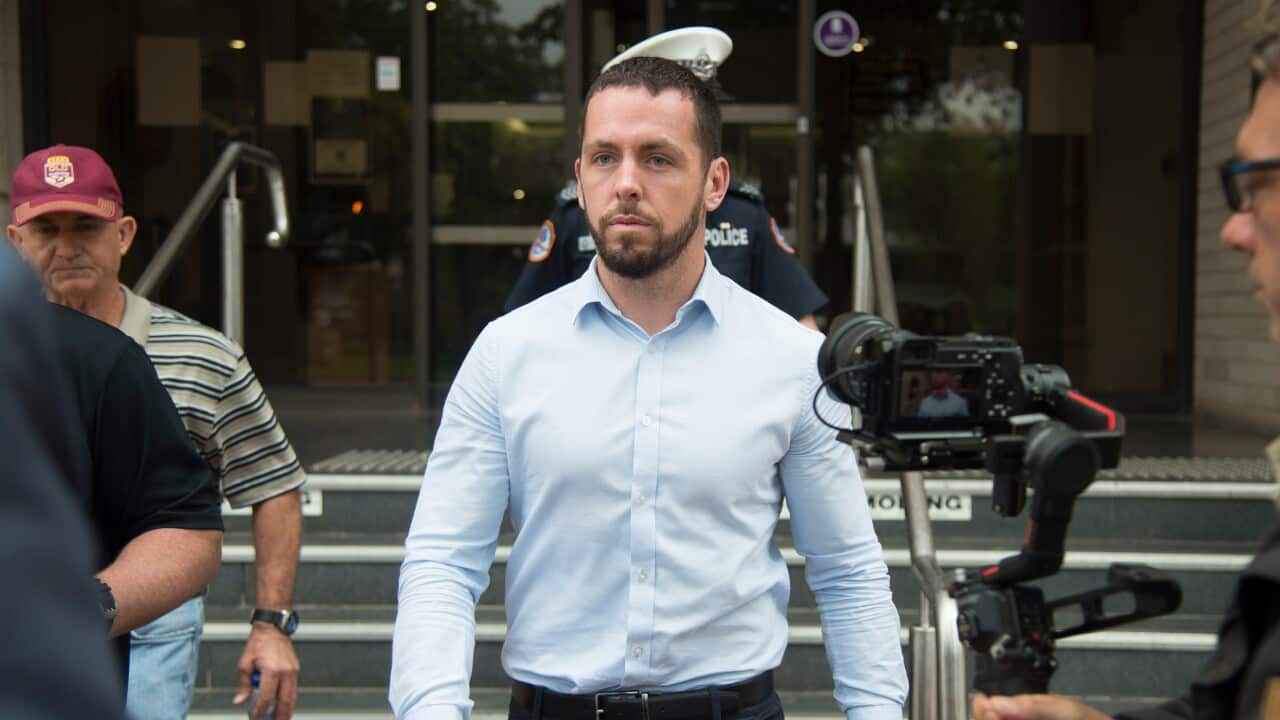Warning: this story contains images of an Aboriginal person who has died, and extremely offensive racist language.
Lottie Robertson will never forget the day Kumanjayi Walker was shot in the small Northern Territory town of Yuendumu.
She had been to a funeral and was heading back to the car.
"Everybody heard that shot and they all raced down, we all raced back," she said in video testimony during the coronial inquest into Kumanjayi Walker's death.
"And then I got a phone call from my daughter in law: [Kumanjayi] has been shot.
"We all started uproar, we had just been to a big, sad funeral for one of our family members and ... that was all just too much.
"We can’t get over that feeling."
On Thursday, after hearing from more than 70 witnesses and generating almost 2000 pages of submissions over the course of two years, the coronial inquest came to a close.
Former constable Zachary Rolfe shot 19-year-old Kumanjayi Walker three times during an attempted arrest in Yuendumu, 300 kilometres from Alice Springs, on November 9, 2019.
Following a six-week trial in 2022, an NT Supreme Court jury
Stream free On Demand

Tuesday March 15, 2022
episode • The Point • Current Affairs • 28m
episode • The Point • Current Affairs • 28m
The family and community - and the wider Northern Territory - are still affected.
"It is a really strange thing that happened in our community," Ms Robertson said in her testimony.
"It happens in other places – in America, in Africa, wherever, in other states in Australia – but not in outback like Yuendumu ...
"These community police who have been working here, they should be recognised for doing a good job.
"But the people like the ones who came in to do this thing took a young man’s life.
"He’s [Rolfe] not a hero, he’s just somebody who took somebody’s life."
On that point, Mr Rolfe's lawyer, Luke Officer, agrees.
In a closing submission to Judge Elisabeth Armitage this week, Mr Officer said there were no winners in the truly tragic circumstance.
"A young man lost his life and another young man ... was charged with murder," he said, urging the coroner to apply the common sense the authorities demand.
He also told the court all evidence regarding racism or racist behaviour was irrelevant to the cause of death under the NT Coroner's Act.
During the inquest, multiple text messages between Mr Rolfe and other serving police officers and friends were read out, describing Aboriginal people as "c**ns", "ni**as" and "neanderthals".
In other texts Rolfe made disparaging remarks about women, bush cops and gay people.
Mr Officer claimed that the private text messages that Mr Rolfe had sent, which also discussed the use of excessive force against Indigenous people, should never have been part of the coronial inquest.
“They had no direct connection to the shooting … they had nothing to do with the cause of death," Mr Officer said, also pointing out that his client had provided evidence of racist practices within the that other police officers had lied about in court.
“He became a target in the way he in which the messages were deployed, the way in which he was cross-examined.”
Mr Officer went on to say there was no evidence from any officers that Mr Rolfe had acted in "any other manner than otherwise professional [and] courteous in his discharge of his duties."
Mr Officer said Mr Rolfe had no obligation to prove anything and no duty to the inquest to prove something or a fact.
Lawyer for NT Police Dr Ian Freckleton told the inquest the text messages were not reflective of the broader force and said reform was already underway through a new anti-racism strategy being led by Central Arrernte woman Leanne Liddle.
“It is absolutely undeniable that Mr Rolfe is a racist," he said.
"It is clear enough he is a sexist, he’s a misogynist, he is homophobic and he has disrespect for authority and contempt for bush cops.
“The position of the NT Police force is that it is trying to call it as it is and do something about people who behave that way in its force.”
Final submissions by Mr Officer labelled the inquest too broad and erroneous, saying Justice Armitage risked overstepping her powers under the Coroner's act.
He said any adverse findings against his client would compromise the Supreme Court verdict that acquitted Mr Rolfe of all charges related to the shooting.
“It will cut across the sanctity of the jury verdict … that is making findings or comments that an offence may or has been committed," he said.
In her final submission, counsel-assisting Peggy Dwyer delivered a scathing assessment of Mr Rolfe, saying he was "undisciplined, ego-driven and contemptuous of authority", which Mr Officer rejected.
Dr Dwyer said Mr Rolfe was a man whose ego was wrapped up in his use of force.
"(He) took pride in, and derived a sense of worth from expressing his dominance over others ... they were generally Aboriginal men and he expressed that dominance with the use of force," she said.
She said he would boast about the use of excessive force which was indicative of his "fascination with violence".
Coroner Elisabeth Armitage will now go away and assess the mountain of evidence before her.
She is expected to hand down her findings next year.
READ MORE

Kumanjayi Walker’s life mattered
But for Ms Robertson the memory of Kumanjayi will never fade.
"Losing somebody like that - it’s in our mind, it’s in our heart, it’s in our spirit, we still think about it," she said.
"I don’t know about him, the man who took this life, I don’t know what he thinks.
"It’s just cutting short a young man’s life.
"He could have just found some way to be able to take him back without taking his life."
Ms Robertson said Yuendumu wants to build strong connections with the police that are working in the community so they can work together.
"We won’t live for ever, but we want to be able to teach our young people and help them go through this life," she said.
"Teaching them, talking to them, whatever things they are doing that‘s bad for them - alcohol, whatever drugs they are taking, we want to be able to talk to them.
"That’s a way we can remember that young fella, to be able to help other young people, save their lives."
Every time she talks about Kumanjayi Walker it's emotional, Ms Robertson said.
"Because I lived with him, I cared for him," she said.
"I cared for him in this house.
"My granddaughter found joy and happiness with him.
"We talk about him all the time, even our family do it.
"And it’s a very strange picture that we see all the time in our mind: how his life was cut short by a stranger, by a strange weapon."

















